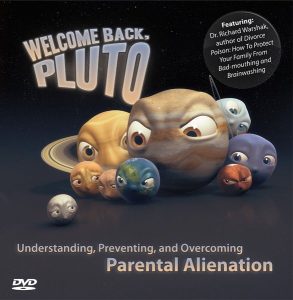Children who feel pressured by a parent to disrespect and reject their other parent risk losing a healthy connection to both their parents. This is true whether the pressure is subtle or obvious, inadvertent or intentional.
“Welcome Back, Pluto: Understanding, Preventing, and Overcoming Parental Alienation” was created to help children facing this risk.
A parent left this review on Amazon.com:
“It has totally changed the dynamics of the alienation on its head in my household by opening my children’s eyes to what was really happening to them and how they can cope. I love that it gives children alternatives to listening to the preferred parent’s degradation of the target parent. Don’t give up if you are a target parent. Show your children this video, read Divorce Poison and get counseling. Your children deserve and need both parents in their life.”
Here are nine tips discussed in “Welcome Back, Pluto” that children and teens have found helpful. Perhaps one of more of these tips will resonate with a child you know who is caught between two parents.
- When you see the rejected parent, instead of thinking about how you do not like this parent, tell yourself that you will have a good time and act like you used to when you liked this parent. You will find that it feels much better to get along well with your parents.
- Join after-school activities and get involved in interests outside the family.
- Spend time with friends who understand you and help you find better ways to handle your feelings.
- Find special things to do with each parent.
- Ask your parents to stop saying bad things about the other parent.
- When a parent bad-mouths the other parent, ask, “Why are you talking like this?”
- Ask your parent, “Will you still love me if I love my other parent?”
- If parents continue to bad-mouth each other, walk away, change the subject, or act bored.
- Express your feelings to your parent in notes or drawings.
These tips empower children to assert their right to give and receive love from both parents and strengthen their positive connection to a parent whom they are encouraged to reject. It helps them see they have choices.
The tips encourage children to create positive experiences with a parent who is the target of bad-mouthing. Behaving positively toward a person, even if the behavior takes effort and feels ingenuine, can evoke positive feelings. Acting nice toward a parent who deserves affection feels better than showing unreasonable contempt. Directing children’s attention to these better feelings helps them experience the direct rewards of healthier behavior toward others.
Children usually need not fear a parent’s withdrawal of love if they fail to please the parent by rejecting the other parent. When their child asks, “Will you still love me if I love my other parent?” parents who are not too far out of touch with their children’s needs, and not too caught up in their hatred of their former partner, will be quick to reassure their child of their love. (Although in some tragic instances a parent has punished a child for not rejecting the other parent, or rejected a child who fails to condemn the other parent.)
The tips also help children shield themselves from being in the middle of adult disputes and encourages them to find gratifications outside the family to reduce their exposure to conflict in the family. Naturally, more severely alienated children will be less able to profit from these tips. As with all posts on this blog, on my Facebook page, on my website, and in my other writings, these ideas are general observations and not specific recommendations for your family. The reader must decide whether any suggestion is appropriate for a particular situation.

